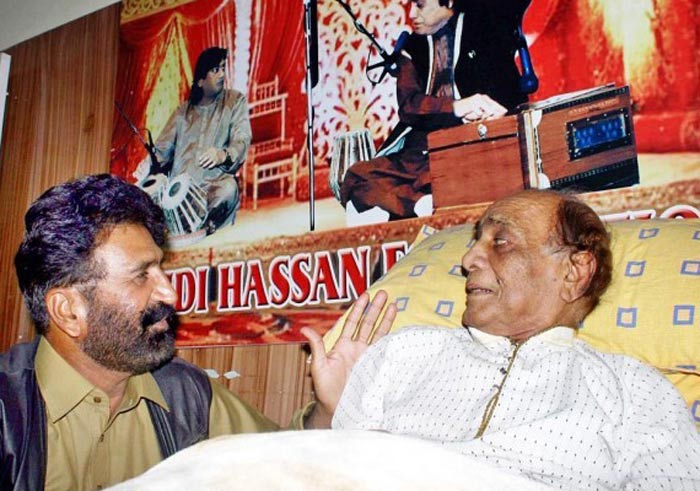GHAZAL GREAT MEHDI HASSAN HAS PASSED AWAY
Hassan had been under treatment in several Pakistani hospitals for lung, chest and urinary tract ailments for the past many years. He was admitted to Karachi's Agha Khan hospital a few days ago after developing severe chest infection and breathing problem. "My father has been ill for the last 12 years but this year, his condition deteriorated significantly."He was discharged from hospital for just one day before being admitted again," said Arif Mehdi, Hassan's son. Hundreds of his fans gathered at the hospital after learning of his death.
Living a humble life in the port city of Karachi, Hassan's heirs demanded from the government that their father should be buried in Jinnah's mausoleum. He'll be laid to rest on Friday in Karachi, his family members said.
Artistes from both India and Pakistan mourned and praised the greatest ghazal singer of all times. Talking to TV stations in Pakistan, the Indian legend Lata Mangeshkar, said that she was deeply saddened by the news of Mehdi Hassan's demise.
She said that it was unfortunate that such a wonderful person had to suffer so much.
"A voice like his may never be heard again. It was because of him that many people had started singing," she said.
Another ghazal maestro Ghulam Ali said: "I'm completely shocked to hear about his demise."
Commending the legacy of Hassan, the Indian poet and lyricist Javed Akhtar, said that his voice gave solace and peace.
Pakistani Sufi singer Abida Parveen said: "Extremely sad news, feeling like I've lost my elder brother. Mehdi always remained dedicated to ghazal singing."
Born in 1927 in a village called Luna in Rajasthan (India), Mehdi Hassan never had a formal education. He was educated solely in the field of classical music since the age of eight by his father Ustad Azeem Khan and uncle Ustad Ismail Khan. Mehdi Hassan was hailing from a family that produced fifteen generations of musicians before him. In several interviews, Hassan called his generation as 'solva pusht' (sixteenth generation) of the traditional musicians.
After India's partition, Khan Saab's family migrated to Pakistan and settled in Punjab's Chechwatni town. During his youth, he experienced many financial hardships. To make his both ends meet, young Mehdi Hassan began to work in a bicycle shop and later became an auto-mechanic.
The struggle ended when Mehdi Hassan got the opportunity to sing on Radio Pakistan from Karachi in 1957 and it did not take him long to become the leading playback singer of the country. There was a time in Pakistani cinema when any production without the song of Mehdi Hassan was considered incomplete. But it was the Urdu ghazal which became his hallmark. Due to his remarkable career in ghazal singing, he was bestowed with the title of Shahenshah-e-Ghazal (The King of Ghazal singing).
Hassan had to cut back on his performances in the late 1980s due to multiple organ illness which aggravated with the passage of time. His sad demise left millions of his followers, not only in India and Pakistan, but across the world in grief.
Hassan was married twice but both of his wives had died before him. He left behind nine sons and five daughters.






 Alas Mehdi spent a lot of the money he earned on drinking and smoking. He was never a drunk, though; he remained alert and agile even when he had consumed a considerable amount. Once in the 1980s I was sent to fetch him for a concert in Faisalabad. He was staying at the Rio Hotel. In his room I learned that he had already drunk a bottle and a half. But instead of tripping him up, it vitalized him: on stage he announced that he was going to present a new ghazal of Ahmed Faraz that he had just composed in the dark and delicate Raag Kirmani. He began his alaap and rendered the bass Pa of the lower octave with such clarity, power and resounding beauty that the hall burst into applause. That unforgettable ghazal was ‘Shola tha jal bujha hu, hawaayein mujhay na do’.
Alas Mehdi spent a lot of the money he earned on drinking and smoking. He was never a drunk, though; he remained alert and agile even when he had consumed a considerable amount. Once in the 1980s I was sent to fetch him for a concert in Faisalabad. He was staying at the Rio Hotel. In his room I learned that he had already drunk a bottle and a half. But instead of tripping him up, it vitalized him: on stage he announced that he was going to present a new ghazal of Ahmed Faraz that he had just composed in the dark and delicate Raag Kirmani. He began his alaap and rendered the bass Pa of the lower octave with such clarity, power and resounding beauty that the hall burst into applause. That unforgettable ghazal was ‘Shola tha jal bujha hu, hawaayein mujhay na do’.